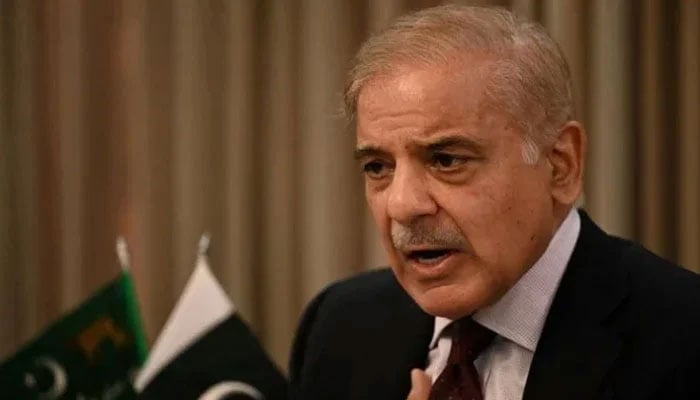Rightsizing the government
Government had announced its plans to do this earlier and now it seems steps are being taken to achieve this goal
Prime Minister Shehbaz Sharif has constituted a committee for the 'rightsizing' of the federal government with particular reference to five selected ministries under specific terms of reference. The government had announced its plans to do this earlier and now it seems steps are being taken to achieve this goal. In light of the recent budget that has put massive pressure on the already struggling people and the salaried class, there has been much criticism -- justifiably -- on how the government has not provided relief to the people while not taking any austerity measures when it comes to the government and its functionaries itself. While it is good to rethink a large cabinet and end ministries that can be done without, some have criticized this move as just something for the optics, though there are optimists who think the government will seriously ‘right-size’ the ministries. According to media reports, the committee has decided to circulate a proforma to seek necessary input from the following ministries, which include the Ministry of Information Technology and Telecommunication, Ministry of Kashmir Affairs & Gilgit-Baltistan, Ministry of States and Frontier Regions (SAFRON), Ministry of Industries and Production and Ministry of National Health Services Regulations & Coordination.
In many countries, ministries are given to competent people who have experience and expertise for the said ministry while they are helped by a professional team. However, in Pakistan we have seen how the size of cabinets bloat to please members of the ruling party or their coalition partners. If a party member is unhappy or a coalition ally is upset, a ministry is handed out to them as though ministries are candies and politicians are little children. This is done without any regard for the fact that running any ministry – even if small in size -- requires money and human resources. If this money and human resource can be put to better use and utilized more efficiently, it helps the state in the long run. By distributing ministries like candies, the state puts a burden on the exchequer when it is not required. In a country like Pakistan where there is an economic crisis and where we need to increase our revenue so that there’s money to give relief to the people, the ruling elite has put more pressure on the salaried class with increased taxes instead of taxing sectors like agriculture, retail and property. However, powerful lobbies have saved themselves from being taxed while the regular citizen suffers.
So, the government’s move of rightsizing itself is welcome as it aims for austerity and getting rid of ministries that are really not needed and are most likely doing work that is already being done by another ministry. When the people see how cell phones worth millions are being ordered for officials or luxury houses are being made for government functionaries or how frivolous debates are being held in parliament – a parliament that should be debating on how the people should be helped and legislating for their betterment – then of course there will be uproar and resentment amongst the people. This is not to say that the government should function without money and not carry out its work but at least it should be cutting down on useless expenditures. At the same time, the government should also start taxing the rich and the powerful instead of taxing already struggling people. When there is an upsurge in the number of people falling below the poverty line, then it is time to worry.
-
 Winter Olympics 2026: Lindsey Vonn’s Olympic Comeback Ends In Devastating Downhill Crash
Winter Olympics 2026: Lindsey Vonn’s Olympic Comeback Ends In Devastating Downhill Crash -
 Adrien Brody Opens Up About His Football Fandom Amid '2026 Super Bowl'
Adrien Brody Opens Up About His Football Fandom Amid '2026 Super Bowl' -
 Barbra Streisand's Obsession With Cloning Revealed
Barbra Streisand's Obsession With Cloning Revealed -
 What Did Olivia Colman Tell Her Husband About Her Gender?
What Did Olivia Colman Tell Her Husband About Her Gender? -
 'We Were Deceived': Noam Chomsky's Wife Regrets Epstein Association
'We Were Deceived': Noam Chomsky's Wife Regrets Epstein Association -
 Patriots' WAGs Slam Cardi B Amid Plans For Super Bowl Party: She Is 'attention-seeker'
Patriots' WAGs Slam Cardi B Amid Plans For Super Bowl Party: She Is 'attention-seeker' -
 Martha Stewart On Surviving Rigorous Times Amid Upcoming Memoir Release
Martha Stewart On Surviving Rigorous Times Amid Upcoming Memoir Release -
 Prince Harry Seen As Crucial To Monarchy’s Future Amid Andrew, Fergie Scandal
Prince Harry Seen As Crucial To Monarchy’s Future Amid Andrew, Fergie Scandal -
 Chris Robinson Spills The Beans On His, Kate Hudson's Son's Career Ambitions
Chris Robinson Spills The Beans On His, Kate Hudson's Son's Career Ambitions -
 18-month Old On Life-saving Medication Returned To ICE Detention
18-month Old On Life-saving Medication Returned To ICE Detention -
 Major Hollywood Stars Descend On 2026 Super Bowl's Exclusive Party
Major Hollywood Stars Descend On 2026 Super Bowl's Exclusive Party -
 Cardi B Says THIS About Bad Bunny's Grammy Statement
Cardi B Says THIS About Bad Bunny's Grammy Statement -
 Sarah Ferguson's Silence A 'weakness Or Strategy'
Sarah Ferguson's Silence A 'weakness Or Strategy' -
 Garrett Morris Raves About His '2 Broke Girls' Co-star Jennifer Coolidge
Garrett Morris Raves About His '2 Broke Girls' Co-star Jennifer Coolidge -
 Winter Olympics 2026: When & Where To Watch The Iconic Ice Dance ?
Winter Olympics 2026: When & Where To Watch The Iconic Ice Dance ? -
 Melissa Joan Hart Reflects On Social Challenges As A Child Actor
Melissa Joan Hart Reflects On Social Challenges As A Child Actor




